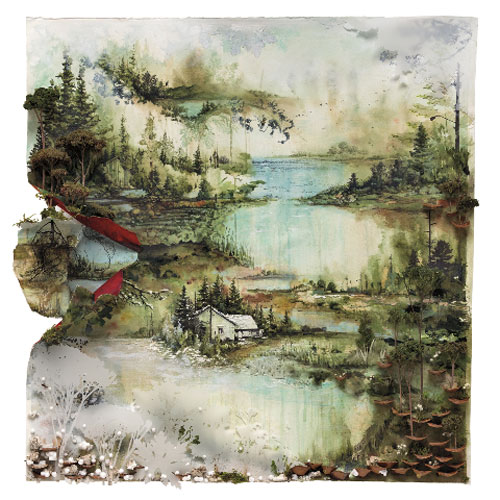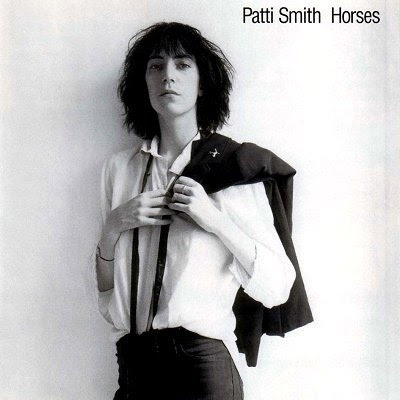 Bon Iver- Bon Iver
Bon Iver- Bon IverIt must be just awesome to be Justin Vernon.
The figure head and main creative force behind Bon Iver, which contrary to the various promotional photos is not a solo Vernon project but a band featuring Michael Noyce, Mathew McCaughn and Sean Carey(who released a solid solo album this year), Vernon is a huge fucking deal. And the thing is, he always has been: this meteoric rise to the top was destined since high school, when Vernon fronted the band Mt. Vernon, whose music was utterly fantastic and was miles ahead of anything you would expect a band whose members were still taking Algebra 2 classes to ever pull off. He then fronted deYarmored Edison, which released a few critically acclaimed albums before Vernon left for solo stardom. It is debatable how much influence Vernon had on the song-writing process at this time, since the rest of dYE would go on to form the incredible Megafaun, but regardless Vernon used his previous experience as a stepping stone into a log cabin to write For Emma and become the Indie darling he is today while kicking it with Kanye West. The whole process reeks of an ego almost as big as the hype, if not bigger, but then again it takes a serious ego to make an album like Bon Iver.
A complete departure from the Iron and Wine-influenced For Emma, Vernon has taken the band in an entirely new direction without any real warning. Synth, electronic music and electric guitars, drums: Vernon bought out the local music shop and jammed it all into the recording studio. Yet it speaks to Bon Iver that despite this new found love all things musical, it remains one of the softest, most sincere releases this year. Ego aside, Vernon just fucking gets it. As here proves here, he can out Dream Pop the Dream Pop-players in one album, with no real practice at is. He remains an idiot-savant for all things hook infused and beautiful. Vernon remains one of the best singers in Indie music: his ability to move effortlessly from a powerful baritone to a charming, if off-kilter, falsetto remains unmatched by any singer in Indie music. This is displayed perfectly in "Minnesota, WI," while the floating guitars of "Holocene" evoke Vernon's criminally over-looked solo album Hazeltons.
I was more than ready slap a 9.5 or even a 10 on this album as it winded down. I was flat out blown away how easily Bon Iver had transitioned from Freak Folk to Dream Pop, and started musing my writings as the song "Beth/Rest" began blasting from my headphones.
I had to pause the record, for I could not stop laughing.
In another absolutely wonderful and wholly misguided effort of the ego, Vernon crapped the bed with "Beth/Rest." The synth will instantly cause you to sing "I can feel it coming in the air tonight..." should be a deadly foreshadowing of the shitstorm that is to come, but when Vernon's auto-tuned moans come groaning over the top of them, it is time to board up the windows and invest in some plastic gloves. It takes serious balls, and frankly a belief that anything you write will be loved automatically, to make a song like "Beth/Rest" and use it as the closing track! It is like Vernon took us on a magical journey we would never forget, only to end at a 65 and over singles bar, complete with slow dancing. No doubt "Beth/Rest" will make it into some High School proms DJ rotation, but for the rest of us this is completely insane and a serious atmosphere killer.
The closing track is a big deal on just about any record, but the way Bon Iver ends is a little inexcusable in my book. This album still has some of the most finely crafted songs of the year, and I would still recommend it to anyone. Just make sure to hit stop before Phil Collins starts his set.
Rating: 8/10
The figure head and main creative force behind Bon Iver, which contrary to the various promotional photos is not a solo Vernon project but a band featuring Michael Noyce, Mathew McCaughn and Sean Carey(who released a solid solo album this year), Vernon is a huge fucking deal. And the thing is, he always has been: this meteoric rise to the top was destined since high school, when Vernon fronted the band Mt. Vernon, whose music was utterly fantastic and was miles ahead of anything you would expect a band whose members were still taking Algebra 2 classes to ever pull off. He then fronted deYarmored Edison, which released a few critically acclaimed albums before Vernon left for solo stardom. It is debatable how much influence Vernon had on the song-writing process at this time, since the rest of dYE would go on to form the incredible Megafaun, but regardless Vernon used his previous experience as a stepping stone into a log cabin to write For Emma and become the Indie darling he is today while kicking it with Kanye West. The whole process reeks of an ego almost as big as the hype, if not bigger, but then again it takes a serious ego to make an album like Bon Iver.
A complete departure from the Iron and Wine-influenced For Emma, Vernon has taken the band in an entirely new direction without any real warning. Synth, electronic music and electric guitars, drums: Vernon bought out the local music shop and jammed it all into the recording studio. Yet it speaks to Bon Iver that despite this new found love all things musical, it remains one of the softest, most sincere releases this year. Ego aside, Vernon just fucking gets it. As here proves here, he can out Dream Pop the Dream Pop-players in one album, with no real practice at is. He remains an idiot-savant for all things hook infused and beautiful. Vernon remains one of the best singers in Indie music: his ability to move effortlessly from a powerful baritone to a charming, if off-kilter, falsetto remains unmatched by any singer in Indie music. This is displayed perfectly in "Minnesota, WI," while the floating guitars of "Holocene" evoke Vernon's criminally over-looked solo album Hazeltons.
I was more than ready slap a 9.5 or even a 10 on this album as it winded down. I was flat out blown away how easily Bon Iver had transitioned from Freak Folk to Dream Pop, and started musing my writings as the song "Beth/Rest" began blasting from my headphones.
I had to pause the record, for I could not stop laughing.
In another absolutely wonderful and wholly misguided effort of the ego, Vernon crapped the bed with "Beth/Rest." The synth will instantly cause you to sing "I can feel it coming in the air tonight..." should be a deadly foreshadowing of the shitstorm that is to come, but when Vernon's auto-tuned moans come groaning over the top of them, it is time to board up the windows and invest in some plastic gloves. It takes serious balls, and frankly a belief that anything you write will be loved automatically, to make a song like "Beth/Rest" and use it as the closing track! It is like Vernon took us on a magical journey we would never forget, only to end at a 65 and over singles bar, complete with slow dancing. No doubt "Beth/Rest" will make it into some High School proms DJ rotation, but for the rest of us this is completely insane and a serious atmosphere killer.
The closing track is a big deal on just about any record, but the way Bon Iver ends is a little inexcusable in my book. This album still has some of the most finely crafted songs of the year, and I would still recommend it to anyone. Just make sure to hit stop before Phil Collins starts his set.
Rating: 8/10

